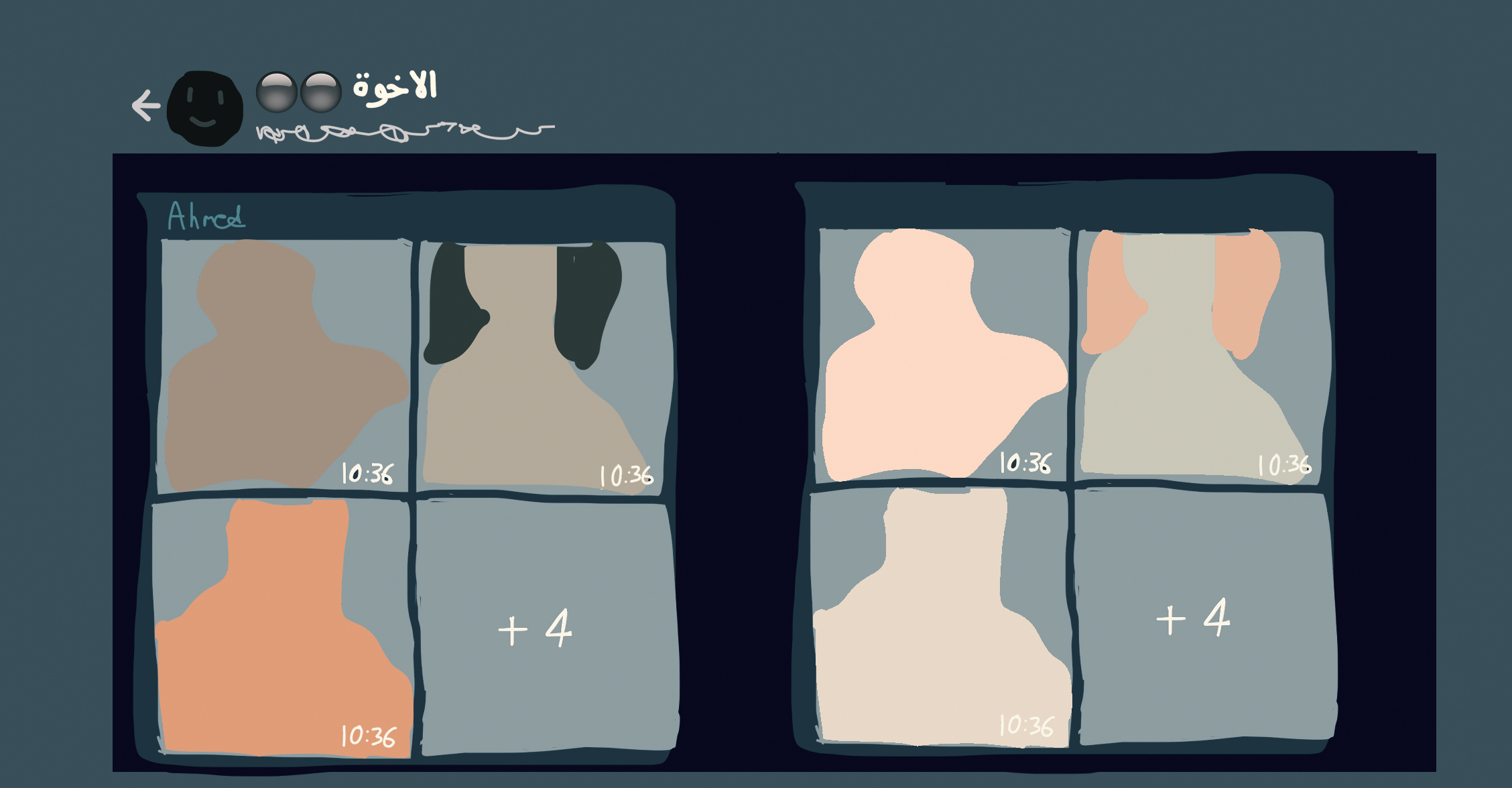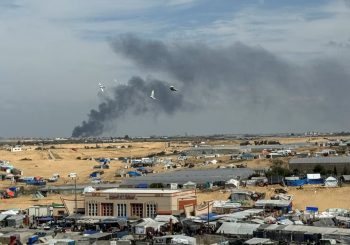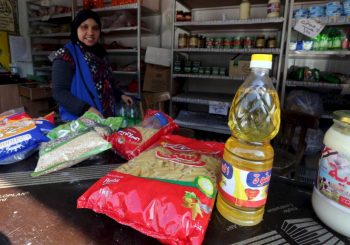On 4 September 2020, American University in Cairo (AUC) Alum Selim Abo Mosallam posted a tweet with screenshots publicizing a non-consensual nude photo sharing “revenge porn” WhatsApp group made up of male members of the AUC’s Black Camp political group.
These are only two examples of AUC’s Black Camp sending nudes without women’s consent to a group of only men that has existed for the better part of a decade. The group has had more than 50 participants, either perpetrators or accomplices. pic.twitter.com/9jlJl5h0yh
— Selim (@trashselim) September 4, 2020
Mosallam’s announcement on Twitter stirred unsurprising outrage, especially given the recent women’s rights movement following the Ahmed Bassam Zaki case and the alleged Fairmont Gang Rape case.
AUC’s Informal ‘Political’ Camps: Black, Red and Blue
“The Black Camp is a political entity/party created to allow members to gain seats in the different branches of student government. Its mandate is basically the same as any other, which is equal opportunity and advocacy for student rights, but obviously it’s more of a fraternity than much else,” said former Black Camp member and General Manager at Student Union Mariam Essawi.
The camps are informal student camps that are not acknowledged by the university. They tend to casually reflect the stances of student beliefs on different social values. There are three camps, Black, Red and Blue, with the Black and Red Camps being the most prominent opponents represented in student elections. Students who belong to whichever camp usually strongly campaign for the representative of their campaign in different elections.

However, the camp system is not one popular with all students at AUC. In earlier years, the camps were more relevant especially within the context of Student Union elections, but the 2019-2020 elections were the first time in years which saw the absence of the camps from the race. None of the four candidates running for president and vice president respectively belonged to any camp, according to AUC’s The Caravan.
In his tweet, Mosallam included that the WhatsApp group had existed for the better part of a decade, and alluded to the fact that the Black Camp at AUC is not the only camp that has been perpetuating these acts.
Speaking to Egyptian Streets, Mosallam said he was first exposed to the Black Camp when a friend briefly told him about the camp system at AUC and encouraged him to campaign for Student Union elections.
“He [the friend] started describing that he is in a camp called Black Camp and I had very little idea what those camps are. The Black Camp allowed women in, and the Red Camp didn’t, so it’s kind of like a democrats and republicans situation. I was like, okay, I guess you guys are the good guys, so I ran his Student Union campaign,” Mosallam said.
Finding a Whistleblower: The Investigation
While running the campaign, someone from the Black Camp told Mosallam that the Red Camp had a group where girls’ private photos were exchanged, without their knowledge. He was appalled and wanted to investigate further, but was discouraged from doing so by members of the Black Camp.
After the elections ended, he asked one of the higher up members of the Black Camp about the group and he was told that there is a group called El Ekhwa (the Brothers), which includes locker room talk, males sending photos and profanity, and, again, was encouraged to let go of his investigation. He also told him that the group was a mix of Black and Red Camp members, though the screenshots and other testimonies state otherwise. It is suggested from Abo Mosallam’s tweet that there is a different group with similar content between Red Camp members that is yet to be exposed.
After graduating and finishing his mandatory army service, Mosallam started looking into the issue again and made a Twitter thread asking for help identifying the group and its members.
“I was like ‘hey, you have a chance to do the right thing; reach out, give me information if you know anything about Group El Ekhwa.’ And of course, silence.. No one tried to help me, I reached out, I kept looking, trying to find any breach inside the camp but everyone reacted like ‘No, I need to protect my boys,” Mosallam told Egyptian Streets.
He explained that members kept giving him different statements regarding the content and activities of El Ekhwa group. Moreover, the information he was given was contradictory.
Eventually, the whistleblower that confessed to Mosallam told him that the photos being sent were part of building a sort collective, joining together the camp by sending each other these photos, building some sort of strong bond.
“The people in the camps always consistently refer to each other as brothers like ‘you’re my brother’, it’s a very cult-like mentality, ‘if we shared doing something wrong together, then for sure I’m going to stick by you when things get tough, if there are fights’,” Mosallam added.
With the new semester starting, Mosallam said that he knew there was going to be freshmen joining and there would be new recruits in the camps, so he felt that by sharing this information, he can stop the cycle.
“This is something that was an ongoing for the past two years and ever since I’ve known about it, I was trying to pick up clues. Finally, someone slipped, gave in and decided to be a better person and to out them and hold themselves accountable,” he added.
Mariam Essawi, who was a Black Camp member until recently, was not aware that this photo-sharing group was affiliated with the Black Camp.
“I’ve been told about these kinds of groups specifically in relation to AUC a while ago, but no one had any proof and we were all advised to just be careful,” Essawi said.
There is also fluctuating information about how many people were in the group.
“At first I thought around 20 and then I was told about 50, and the final confirmation that was given to me yesterday was that, around 2018, there were around 80 people on the group. That’s the biggest estimate that I’ve gotten,” Mosallam said.
He stated that the “Group ElEkhwa” has existed since 2012, and he does not have an estimate for the Red Camp’s group yet except that it has existed for the better part of a decade. He also said that as far as has been confirmed to him, ever since approximately late 2017, with the older classes leaving the group, new people joined and cleaned up shop in the Black Camp.
“These people, at that time, haven’t released any nudes on the group. So, it was mostly inactive for, I’m guessing, two years. No one can confirm any case of revenge porn in the past two years. However, this information might change, and I do not have all the information,” he said.
Nonetheless, Essawi has stated that the group was not shut down and remains active today.
“The last time nudes were sent was early 2019, but the group still exists to this day and has people on it,” she said.
Accountability, Consequences
On September 7th, AUC issued a statement expressing awareness of the situation, stating that the university has launched an investigation into the group. They also promised that they will take appropriate action against any individuals found to have engaged in misconduct and encouraged those with evidence to come forward.
While ‘revenge porn’ is not explicitly called out as such in Egyptian law, it is a crime under cyber and information technology laws in Egypt.
Revenge porn is defined by the European Institute of Gender Equality and UNESCO as the sharing of private, sexual materials, either photos or videos, of another person without their consent and with the purpose of causing embarrassment or distress. Described by UNESCO as a form of ‘online violence’, the images are sometimes accompanied by personal information about the subject, including their full name, address and links to their social media profiles.
In Egypt, Article 25 of Law No. 175/2018 (Anti-cyber and information technology crimes) sets out that any person leaking, sharing or otherwise publishing your photos or any personal information in violation of personal privacy, even if such information is fabricated, can face at least six months imprisonment and a fine between EGP 50,000 and EGP 100,000.
Now that this information is public, Mosallam and Essawi believe there should be repercussions for all those involved.
“The entire list of people that were on the group should be released to the public. People should be wary that these people were accomplices or perpetrators,” Mosallam said.
Mosallam said that they should all release public apologies stating that they were accomplices and that they did not speak up. They should also discuss toxic masculinity culture which continues to exist in the community, and which existed inside the camp.
Essawi said that previous members need to be dealt with depending on their involvement, with those who shared images being held criminally accountable. She believes that those who were members of the group but did not share any images should at least face some social accountability.
“They should be outed to ensure the safety of everyone around them. These people run in predominantly female circles and they have significant others while also contributing to the struggles of women. We all need to be aware of who they are,” she added.
Essawi has said that as a member, she has noticed that the Black Camp has been evasive and has lied about the involvement of current heads.
“To be honest, though, so many people didn’t know about it so apparently it wasn’t a holistic camp. Rather, they were very selective with who they added. The Black Camp has publicly pretended to care about the issue while privately joking about the accusations and the matter and lying about the existence of the group and the details,” she said.
Essawi publicly posted a note on Facebook stating that it did not matter to her whether or not people consumed the content on the group, especially those who actually advocated for the rights of women.
“You still contributed to the pain these women felt. It is terrifying knowing that those you love were complicit in something like this, but it’s also comforting to know they’ve grown and chose to learn from their mistakes and have taken accountability for them. To those who actively circulated and consumed this content, you will get what you deserve,” she said.







Comments (5)
[…] AUC Graduate Exposes Student Revenge Porn Group […]
[…] AUC Graduate Exposes Student Revenge Porn Group Heritage and Nostalgia: How One Man is Trying to Save his 100-Year-Old Family Home […]